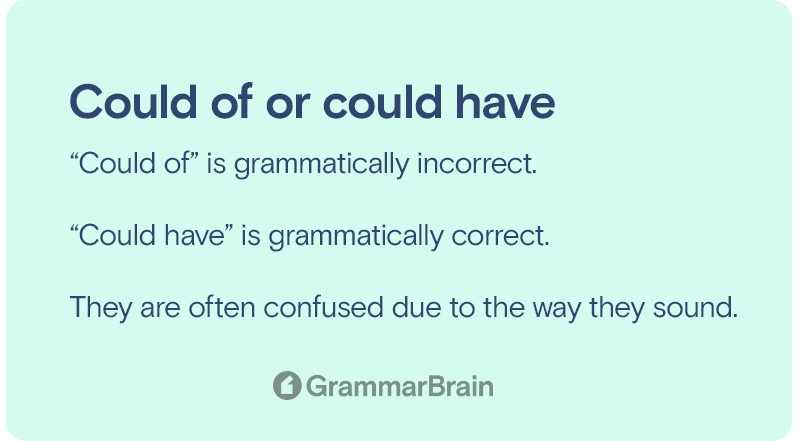Is it “could of” or “could have?” Often people write could of in place of could have by mistake. Perhaps this happens due to the pronunciation of the short form of the phrase “could have” which is “could’ve.” When you pronounce the word “could’ve,” it sounds more like “could of.” And that’s where confusion can arise.
Let’s examine the definition of the phrases ‘could have’, and ‘could of’, and learn which phrase is grammatically correct and when to use it.

What Does “Could Have” or “Could’ve” Mean?
‘Could have’ means ‘a possibility’, the capability to fulfill something. The phrase “could have” is sometimes expressed as a contraction “could’ve,” particularly in American English and speech. And the term “could’ve” perilously sounds like “could of.”
For example:
I could’ve directly gone to university, but I chose to travel first.
Native English speakers sometimes don’t pronounce their past tense modals. “Could have been” typically getting contracted to could’ve been or “coulda’ been.” (slang)
To create the negative form with these modals, use not between the words could and have. “Couldn’t have” means that something was unthinkable in the past (past tense form).
For instance:
- Defense lawyers sometimes use couldn’t have to claim a client’s innocence.
- She couldn’t have been there because I saw her at work just now.
A popular praisein American English is “I could not have said it better myself.” A person can say this as soon as a type of compliment to the other person’s abilities. It’s a phrase to show firm agreement.

What Does “Could Of” Mean?
The phrase “could of” is a common mistake or misspelling of the phrase “could have.” This misunderstanding of the verb phrase came from American English speakers’ way of pronouncing the phrase (the verbal form sounding like “could’ve”).
It’s not uncommon for American English speakers to write could’ve in regular speech. This omits the emphasized –H sound that distinguishes have from of.
Since ‘could’ve’ generally sounds nearly like ‘could of’ if spoken aloud in the American English dialect, people often mistakenly think ‘could of’ is the proper form of this phrase.
“Could have” is typically a verb phrase. However, ‘of’ isn’t a verb. Instead, the modifier “of” is typically used as a preposition, and it’s not a synonym to could have.
Examples of “Could Have” in Sentences
- She could have run faster if her leg had not hurt her.
- I could not have said this better myself. He indeed said it well.
- Are you completely out of your mind? How could you do that? You could’ve crashed yourself into that wall!
- Couldn’t we have left this party earlier?
- You could have been just honest with her. She trusts you so much! How could you cheat her?
- If you were I, I couldn’t have ever done that to her. She is your best friend, after all.
- We could have stopped by that grocery store. Haven’t I told you earlier that we need to buy some milk?
- You could have purchased the cheaper jacket. Irrespective of the price, it looked amazing on you.
- I could not have done this piece of sh*t without you. Thank you so much for your cooperation.
Conclusion
The phrase “could of” is grammatically incorrect and shouldn’t get used in the English language. The expression “could of” is nothing but a grammar mistake. The grammatically correct form is “could have.” In place of “could have,” you can also use “could’ve.”
FAQs
Which is correct could have or could of?
The correct term is ‘could have,’ and not ‘could of.’ Could of is a common mistake made, especially by non-English speakers and writers. This confusion arises from the contraction form of “could have,” which is could’ve. Since “could’ve” sounds more like “could of,” many people use this by mistake.
Do you say could have or of?
You should always say “could have” instead of saying “could of.” However, “could have” is sometimes spoken as the contraction word “could’ve,” particularly in American English dialect. And the term “could’ve” perilously sounds like “could of”.
How to remember which one is correct could of or could have
Keep this in mind, “could” is always a helping verb. It has to be with another verb like ‘have.’ But “of” isn’t a verb. It is an auxiliary verb.
Inside this article
Fact checked:
Content is rigorously reviewed by a team of qualified and experienced fact checkers. Fact checkers review articles for factual accuracy, relevance, and timeliness. Learn more.
Core lessons
Glossary
- Abstract Noun
- Accusative Case
- Anecdote
- Antonym
- Active Sentence
- Adverb
- Adjective
- Allegory
- Alliteration
- Adjective Clause
- Adjective Phrase
- Ampersand
- Anastrophe
- Adverbial Clause
- Appositive Phrase
- Clause
- Compound Adjective
- Complex Sentence
- Compound Words
- Compound Predicate
- Common Noun
- Comparative Adjective
- Comparative and Superlative
- Compound Noun
- Compound Subject
- Compound Sentence
- Copular Verb
- Collective Noun
- Colloquialism
- Conciseness
- Consonance
- Conditional
- Concrete Noun
- Conjunction
- Conjugation
- Conditional Sentence
- Comma Splice
- Correlative Conjunction
- Coordinating Conjunction
- Coordinate Adjective
- Cumulative Adjective
- Dative Case
- Determiner
- Declarative Sentence
- Declarative Statement
- Direct Object Pronoun
- Direct Object
- Diction
- Diphthong
- Dangling Modifier
- Demonstrative Pronoun
- Demonstrative Adjective
- Direct Characterization
- Definite Article
- Doublespeak
- False Dilemma Fallacy
- Future Perfect Progressive
- Future Simple
- Future Perfect Continuous
- Future Perfect
- First Conditional
- Irregular Adjective
- Irregular Verb
- Imperative Sentence
- Indefinite Article
- Intransitive Verb
- Introductory Phrase
- Indefinite Pronoun
- Indirect Characterization
- Interrogative Sentence
- Intensive Pronoun
- Inanimate Object
- Indefinite Tense
- Infinitive Phrase
- Interjection
- Intensifier
- Infinitive
- Indicative Mood
- Participle
- Parallelism
- Prepositional Phrase
- Past Simple Tense
- Past Continuous Tense
- Past Perfect Tense
- Past Progressive Tense
- Present Simple Tense
- Present Perfect Tense
- Personal Pronoun
- Personification
- Persuasive Writing
- Parallel Structure
- Phrasal Verb
- Predicate Adjective
- Predicate Nominative
- Phonetic Language
- Plural Noun
- Punctuation
- Punctuation Marks
- Preposition
- Preposition of Place
- Parts of Speech
- Possessive Adjective
- Possessive Determiner
- Possessive Case
- Possessive Noun
- Proper Adjective
- Proper Noun
- Present Participle
- Prefix
- Predicate



